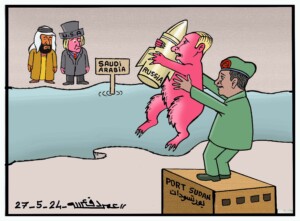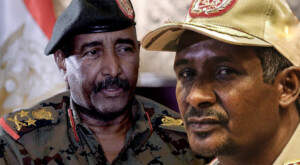Darfur security arrangements discussed at Sudan peace talks
The Sudanese government and the armed movements discussed the future security arrangements in Darfur yesterday. The peace talks took place via video conferencing.
 The preparation of the peace talks in Juba in September 2019 (Social media)
The preparation of the peace talks in Juba in September 2019 (Social media)
The Sudanese government and the armed movements discussed the future security arrangements in Darfur yesterday. The peace talks took place via video conferencing.
An agreement on the Darfur track is expected soon.
The latest deadline for signing a comprehensive peace agreement has been set at June 20 by the South Sudanese mediation team. During the preparations for the negotiations, in September last year, the parties pledged to end the talks before 14 December.
The direct peace talks started in Juba on October 14 last year. The deadline was later set at February 14, and then again at March 7.
On May 17, the South Sudanese mediation team announced that the first documents of the peace agreement would be signed on June 20.
On Wednesday, the government and the Sudan Revolutionary Front (SRF) rebel movement alliance Darfur track team discussed security arrangements in the presence of Minister of Defence Maj Gen Yasin Ibrahim.
Following this session, Deputy Chairman of the Sovereign Council of Sudan and Commander-in-Chief of the Rapid Support Forces, Lt Gen Mohamed Hamdan ‘Hemeti’, confirmed that a comprehensive and sustainable peace agreement with the SRF will be signed on June 20.
At the end of the first negotiation session on ‘national issues’ on Wednesday, Hemeti stated that the two parties managed to address the issues of war and peace in a way that will lead to a comprehensive and just peace.
Arrangements are being made now to find a solution for the remaining outstanding issues on power sharing, he said. The next steps are the drafting of an implementation matrix, including timetables, and the final peace agreement.
SPLM-North
Hemeti called on the Sudan People’s Liberation Movement-North faction under the leadership of Abdelaziz El Hilu (SPLM-N El Hilu) and the mainstream Sudan Liberation Movement headed by Abdelwahid El Nur (SLM-AW) to join the peace negotiations.
SPLM-N El Hilu joined the peace negotiations separately. The talks reached a stalemate at the end of December last year, as the rebel faction adhered to its long-standing position with regard to self-determination and a secular state, while the government did not seem inclined to cancel the Sharia (Islamic law), imposed by the regime of Jaafar Nimeiri in September 1983.
The talks resumed in mid-January, but no progress was reported. In a statement dated May 28, the SPLM-N El Hilu denied rumours that they withdrew from the peace negotiations.
“We deposited our position paper on State and Religion to the South Sudanese mediation team on 26 February 2020, and received no response from the government up to this moment,” Amar Deldoum, the movement’s chief negotiator stated.
The SLM-AW in Darfur withdrew from the SRF when the rebel alliance opted for a peaceful solution instead of continuing the armed struggle. El Nur says he will only join peace negotiations after Khartoum has restored stability and security in Darfur.
El Burhan
The Chairman of the Sovereign Council and Commander-in-Chief of the Sudan Armed Forces, Lt Gen Abdelfattah El Burhan, stressed yesterday that the security authorities in Sudan “favoured change and will proceed with sincerity and impartiality in order to reach an elected government”.
El Burhan presented last week’s UN Security Council resolutions on the extension of the Unamid peacekeeping mission until December 31, and the establishment of new political UN mission in Sudan, to security and police officers yesterday. He said that he appreciated the government’s efforts to achieve an end to the Unamid peacekeeping mission, and ensure that the new UN mission Unitams will have as it main task to assist the Sudanese government in achieving peace and democracy.
He stated that these efforts helped to ensure that the UN resolutions were accepted. He stressed that the new UN mission respects Sudan’s national sovereignty, and will end when the 39-month transitional period ends. He also said that when Unamid leaves Darfur on December 31, the Sudanese government will assume its responsibilities and provide security and safety for the people.
Radio Dabanga’s editorial independence means that we can continue to provide factual updates about political developments to Sudanese and international actors, educate people about how to avoid outbreaks of infectious diseases, and provide a window to the world for those in all corners of Sudan. Support Radio Dabanga for as little as €2.50, the equivalent of a cup of coffee.












 and then
and then